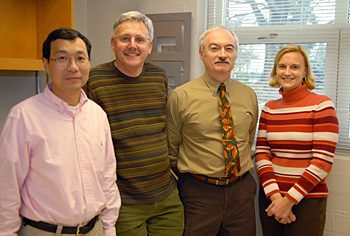
You see, Hoover's recipe isn't for the guacamole itself but for the innovative processing technique that food manufacturers use to ensure that store-bought guacamole isn't just safe but almost as fresh-tasting as the homemade variety.
A professor of food microbiology, Hoover is a world leader in high-pressure processing techniques. His colleagues in UD's food science program--Rolf Joerger, Kali Kniel and Haiqiang Chen--boast similarly impressive resumes. This small but mighty team leads a program that is internationally known for its research in food safety and emerging food processing and preservation techniques.
The food science program's latest achievement came last week when it was awarded a $156,000 two-year grant from the United States Department of Agriculture's Higher Education Food and Agricultural Sciences National Needs Graduate and Postgraduate Fellowship Program. The grant will be used to recruit and train food science graduate students in innovative food processing and preservation technologies.
“The food industry and research institutions have a very high demand for graduate students with training in food processing and preservation techniques related to food safety,” Hoover said. “This grant will fund four graduate fellows who will benefit from our interdisciplinary program that integrates the areas of food science, virology, biology, microbiology, molecular biology and chemistry.”
The fellowship will feature experiential learning opportunities at various industry and government laboratories, including the USDA Agricultural Research Service Laboratory in Beltsville, Md., and Du Pont Chemical Enterprise Solutions in Wilmington, Del. Research facilities at UD available to the Fellows include the Delaware Biotechnology Institute and UD's Allen Biotechnology Laboratory.
Specific areas of research that the food science program currently studies, in addition to high-pressure processing, include antimicrobial packaging, the use of zero-valent iron to remove pathogens from agricultural water, and inactivation of virus and bacteria via pre- and post-harvest treatments.
Haiqiang Chen, who led the effort to acquire the grant, said he appreciates the fact that his research into antimicrobial packaging has a direct impact on consumers' lives. The technology is currently used by food manufacturers to ensure the safety of ready-to-eat meats.
Chen came to UD as a postdoctoral student in 2001 and joined the faculty two years later. “I enjoy the atmosphere here; it's very collegial,” Chen said. I'm sure the individuals selected to become our new research fellows will be as impressed with UD as I am.”
Kali Kniel said she is looking forward to working with the new fellows because she is just as passionate about teaching as she is about research. “UD places a great emphasis on teaching while maintaining its status as a research university,” Kniel said. “I have been given the opportunity to set up an excellent research laboratory while also participating in teaching-related activities as a fellow for the Center for Transforming Undergraduate Education.”
Food safety instruction, research and outreach are primary focus areas in the Department of Animal and Food Sciences, according to Jack Gelb Jr., department chairperson. “We are thrilled to receive this grant,” says Gelb. “It will help us identify and train graduate students in an area of critical need. The fact that USDA made this award to UD speaks volumes about the quality of our faculty and programs in food science.”
Article by Margo McDonough
Photo by Danielle Quigley

